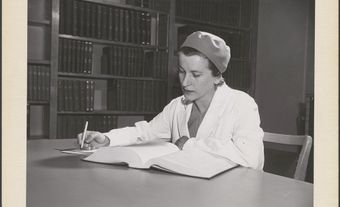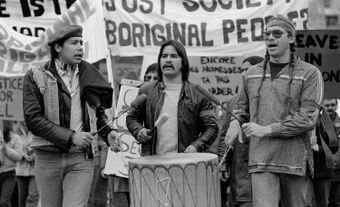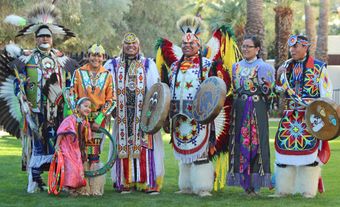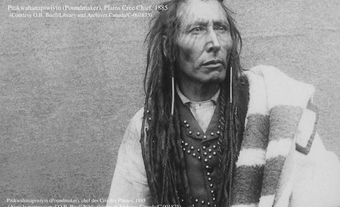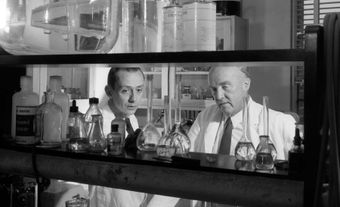Indigenous scientists and researchers in Canada have helped to advance their respective professional fields by posing new questions to seek better ways of thinking, healing and understanding. Many of them have incorporated both Western and Indigenous perspectives and teachings into their important work. In many cases, these individuals have faced discrimination and systemic racism, and persevered. Many have the honour of being the first Indigenous person to graduate and practice in their professional field. This article lists some of the most accomplished Indigenous individuals in Canada who have excelled in the areas of science, research and related fields.
1. Nadine Caron (Ojibwe; Italian-Canadian)

After earning her Bachelor of Science degree in Kinesiology from Simon Fraser University in 1993, Nadine Caron became the first Indigenous woman to graduate from the University of British Columbia's medical school. She earned a master’s degree in Public Health at Harvard and then completed her surgical residency at the University of California, where she specialized in endocrine surgical oncology. (See also Health of Indigenous Peoples in Canada.)
In accepting a position at the Prince George Regional Hospital in 2005, Caron became the first female Indigenous general surgeon in Canada. She also excelled as an associate faculty member at the Johns Hopkins Center for American Indian Health in Duluth, Minnesota, and as a professor in the Department of Surgery at the University of British Columbia’s Faculty of Medicine. Caron leads the University Hospital of Northern British Columbia’s Northern Biobank Initiative, which allows those in remote, usually Indigenous, communities access to specialized genomic research and better medical care. In 2020, Caron was named the University of British Columbia’s founding First Nations Health Authority Chair in Cancer and Wellness. In all her work, Caron is advancing the coexistence of Indigenous healing practices with Western medicine.
2. Lillian Eva Dyck (Cree; Chinese)

Lillian Dyck earned her Bachelor of Arts degree at the University of Saskatchewan and then a Master of Science degree in Biochemistry and, in 1981, became the first First Nations woman in Canada to earn a PhD. She became a professor of neuropsychiatry research in the university’s psychiatry department and then the Associate dean of the College of Graduate Studies and Research. Dyck led a team of researchers determined to find a drug to combat Alzheimer’s and to discover why Indigenous peoples can be predisposed to alcoholism. She contributed a great number of articles to respected journals.
In 2005, Dyck was appointed to the Canadian Senate, where she became chair of the Standing Senate Committee on Aboriginal Peoples. She advanced legislation to end the practice of Indigenous women losing their status when they married non-status men and was influential in changing laws that would ensure fairness in sentencing when a First Nations woman is the victim of assault or murder. She also devoted her talents to the ongoing crisis of missing and murdered Indigenous women and girls. Dyck retired from the Senate in 2020.
3. Aimée Craft (Métis)
Aimée Craft is a lawyer, teacher and researcher who, after graduating from the University of Victoria, began her work at the University of Manitoba. Craft served as the director of research at the National Inquiry into Missing and Murdered Indigenous Women and Girls and was the founding director of research at the National Centre for Truth and Reconciliation. (See also Truth and Reconciliation Commission.) She was internationally recognized as an influential researcher and, in 2016, was voted one of the top 25 most influential lawyers in Canada.
Craft moved to the University of Ottawa’s Faculty of Law in 2017. As an associate professor, she continued her Indigenous-led, multidisciplinary research focused primarily on water, treaties and Indigenous governance. Her award-winning book, Breathing Life into the Stone Fort Treaty, addressed why it is important to understand treaties from Indigenous perspectives. Her children’s book, Treaty Words: For as Long as the Rivers Flow, presents to children in a simplified way the underlying philosophy of treaties in Canada. In 2021, Craft earned the University of Ottawa’s 2020 Early Career Researcher of the Year Award and was appointed Research Chair for her research on Nibi miinawaa aki inaakonigewin: Indigenous governance in relationship with land and water.
4. Stanley Vollant (Innu)

Stanley Vollant was born in Quebec City’s Society of Saint Vincent de Paul children’s shelter and was raised by his grandparents in the North Shore community of Pessamit. Vollant entered the École polytechnique at the Université de Montréal with the hope of becoming an engineer but, in 1984, transferred to the university’s medical school.
When Vollant began his practice at the regional hospital in Baie-Comeau, he became the first Innu surgeon in Quebec. He also became the first Indigenous person in North America to lead a medical association when, in 2001, he was elected president of the Quebec Medical Association. After serving in the Health and Social Services Centre in Chicoutimi, he moved to Ottawa to practise general surgery at Hôpital Montfort. He was also the director of Aboriginal Studies at the University of Ottawa’s Faculty of Medicine. Vollant led the effort to create the 6,000-kmInnu Meshkenu (My Innu Path), which begins in Labrador and links many Indigenous communities in Quebec and Ontario. He also created Puamun Meshkenu, or “path of a thousand dreams,” a non-profit organization to support Indigenous people in developing their spirits, bodies and emotional well-being.
5. Janet Smylie (Métis)
Janet Smylie studied at Queen’s University, University of Ottawa, University of Toronto and Johns Hopkins University. One of the first Métis doctors in Canada, she practised in urban, rural and remote Indigenous communities. Smylie dedicated herself to researching and addressing the challenges facing Indigenous peoples with health problems that stem from systemic racism.
She published over 100 peer-reviewed articles, addressed audiences across Canada and around the world, appeared on radio and television, and is an advisor on the National Statistics Council of Canada. Smylie directs cutting-edge research as the director of the Well Living House Action Research Centre for Indigenous Infant, Child, and Family Health and Wellbeing at Toronto’s St. Michael’s Hospital. She leads research to determine the best ways to blend Western medical practices with traditional Indigenous knowledge to improve reproductive, child and family health. Smylie also is an associate professor at the University of Toronto, the Applied Public Health Research Chair at the Canadian Institutes of Health Research, and an adjunct scientist at the Institute for Clinical Evaluative Sciences. In 2015, The College of Family Physicians of Canada named Smylie a Top 20 Pioneer of Family Medicine Research.
6. Nel Wieman (Anishinaabe)
Nel Wieman was born in Manitoba, a member of the Little Grand Rapids First Nation. She is a survivor of the Sixties Scoop, a government process that involved removing Indigenous children from their families and adopting them to non-Indigenous families. After graduating from McMaster University in 1998 with a medical degree and training in psychiatry, Wieman provided psychiatric services at the Six Nations of the Grand River. She was the first female Indigenous psychiatrist in Canada.
Beginning in 2004, she served for seven years as the University of Toronto’s co-director of the Indigenous Health Research Development Program and taught at its Dalla Lana School of Public Health, Faculty of Medicine. Wieman became renowned as a passionate advocate for those with mental health issues who were also experiencing trouble finding help due to systemic racism. She was a special consultant to the chief public health officer of the Public Health Agency of Canada and then, in 2018, was appointed the Senior Medical Officer, Mental Health & Wellness at British Columbia’s First Nations Health Authority (FNHA). In January 2023, she was appointed to the position of Acting Chief Medical Officer of the FNHA. The respect she has earned among her peers was demonstrated when she was chosen to be president of the board of the Indigenous Physicians Association of Canada.
7. Leroy Little Bear (Siksika)
In the early 1970s, Leroy Little Bear became one of the first Indigenous students to earn a Bachelor degree from the University of Lethbridge. He went on to earn a law degree at the University of Utah. Back at the University of Lethbridge, Little Bear focused his passion and skills as a researcher and faculty member. He founded, and for over 20 years chaired, the Native American Studies Department.
He brought his research skills to his position as advisor to First Nations and the provincial and federal governments on land claims, hunting and fishing, and treaty issues. Little Bear also served on a number of government commissions and boards, including the Task Force on the Criminal Justice System and Its Impact on the Indian and Métis Peoples of Alberta. In 1998, he moved to Harvard University for a year and a half to serve as director of its Native American Program. After retiring from the University of Lethbridge in 1997, he focused new research on the blending of Western physics with North American Indigenous science, particularly, the richness of Siksika (Blackfoot) knowledge and teachings as expressed through Oral Traditions.
8. Deborah McGregor (Anishinaabe)
Deborah McGregor grew up as a member of the Whitefish River First Nation. She began her career as an associate professor in the University of Toronto’s geography department and as director of the Centre for Aboriginal Initiatives and the Aboriginal Studies Program. She joined York University's law faculty in 2015 and was cross-appointed with the Faculty of Environmental and Urban Change. She focused her research on Indigenous systems of knowledge and understanding. McGregor was the lead researcher for Indigenous Environmental (In)Justice: Theory and Practice. She was the coinvestigator for three important research projects: Conservation as Reconciliation: Supporting the Transformation of Conservation in Canada; Cultural Keystone Wildlife in a Changing World: Weaving Together Indigenous Knowledge, Cultural Preservation, and Conservation; and Sustainable Water Governance and Indigenous Law. Other important and ambitious projects are ongoing, such as Indigenous Knowledge Transfer in Urban Aboriginal Communities.
McGregor earned international praise for the content of her work and for her innovative methods that included using digital and social media to engage Indigenous communities. She was appointed Canada Research Chair (Tier 2 Renewal) in Indigenous Environmental Justice, and has received the York University Research Leader Award.
9. Jessica Kolopenuk (Cree)
Jessica Kolopenuk, of the Peguis First Nation, earned her PhD at the University of Victoria. As an assistant professor in the Faculty of Native Studies at the University of Alberta, she co-founded and co-led the Indigenous Science, Technology, and Society research and training program, and the Summer Internship Program for Indigenous Peoples in Genomics Canada. The programs ensure that Indigenous peoples participate in scientific research while governing its process and ends. Like those successful programs, Kolopenuk’s work is based on the contention that science is not neutral and objective. Rather, the political power relationship between Indigenous peoples and the Canadian state has always affected the manner in which research has been done and the conclusions reached. Research related to science and technology must be decolonized. Cree concepts of the theory of science, technology and society, for example, must be a fundamental part of ethically based research involving Cree peoples.
Kolopenuk won the Canadian Science Policy Centre’s Youth Award of Excellence in 2018. She works with the Government of Canada and the National Geographic Society to create Indigenous-led, decolonized science policy.

 Share on Facebook
Share on Facebook Share on X
Share on X Share by Email
Share by Email Share on Google Classroom
Share on Google Classroom
